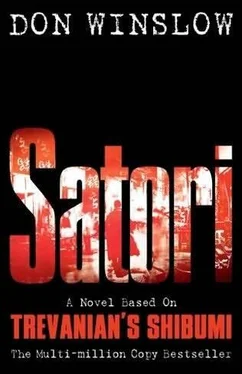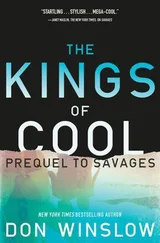“Thank you,” Nicholai said.
“You’re welcome.”
Nicholai was impressed that De Lhandes never asked why he wanted the contents of the envelope or what he intended to do with them.
It has been a long time, he thought, since I’ve had a friend.
Later that morning, Bay Vien personally picked Nicholai up to deposit his winnings in the bank. They rode in his personal car, armored, and escorted by machine-gun-wielding guards.
“You are a difficult friend,” Bay said on the drive.
“How so?”
“You embarrassed the emperor,” Bay said. “In his city, in front of his woman.”
My woman, Nicholai thought. But he said, “You helped me.”
“Everyone saw how you looked at her,” Bay said. “For that alone, not to mention the money, he could kill you.”
“More likely he would ask you to do it.”
“True.”
“And would you?”
Bay said, “I’d feel badly about it – you’re a good guy, for a colon, and you have balls. But don’t kid yourself, Michel – guys like you come and go, I will have to live with Bao Dai for a long time. So if he asks me to get rid of you…”
He didn’t need to finish the sentence.
“I would understand,” Nicholai said.
“Leave Saigon,” Bay said. “Get your money and get out. Tomorrow. Today if you can.”
“I have business here.”
“The rocket launchers?” Bay asked. “Don’t think I’ve forgotten your offer to procure more of them. But do it from Laos. You don’t need to be in Saigon.”
“I have other business here.”
“What kind of business?”
“My business,” Nicholai said.
“Please tell me you are not going after this woman,” Bay said. “I have a dozen blonde Frenchwomen -”
“As I said,” Nicholai snapped. “It’s my business.”
Bay regarded him for a long moment. “Do it quickly, xiao. Do it quickly and get the hell out, before I have to do something that I really don’t want to do.”
They arrived at the Banque de l’Indochine. The Binh Xuyen guards escorted Nicholai and his cash inside.
HE MET WITH THE BANKER, a colon in his mid-fifties, in a private office.
“I wish access to my safety deposit box, please,” Nicholai said.
Laval had heard of this Guibert. All of Saigon had. He said, “I’m sorry, monsieur, but I wasn’t aware that you had a safety deposit box with us.”
“I do,” Nicholai answered. “In the name of Yuri Voroshenin.”
He slid Voroshenin’s passport across the desk. Laval glanced at it and then looked back at Nicholai. “I am informed that Monsieur Voroshenin recently passed away.”
“As you can see,” Nicholai said, “you were apparently misinformed.”
“This is most irregular.”
“Monsieur Laval,” said Nicholai, “the Banque de l’Indochine is most irregular.”
Laval looked insulted. He sat back in his chair and then ran his long fingers across his high forehead. “Do you have any additional identification that might authenticate your identity, monsieur… whoever you are?”
Nicholai nodded, removed an envelope from his jacket pocket, and handed it to Laval. The banker took it, opened it, turned ghostly pale, and sputtered, “This is outrageous.”
“I agree,” Nicholai said. “I imagine Madame Laval would agree as well.”
“How did you get these?” Laval asked, stunned by the photographs of him in bed with a young Cambodian girl.
“Does it matter?”
“This is hardly the act of a gentleman.”
“Again, we are in perfect harmony. Those copies are for you to keep, I have others safely stored away. However, if this is not adequate identification” – he slid a stack of piastre notes across the desk – “perhaps these pictures might suffice.”
Laval hesitated. Then he took the stack of bills and stuffed them and the photos inside his jacket pocket.
He grudgingly led him to the vault and handed him the key.
Nicholai opened the steel box.
Bankbooks for accounts in Switzerland and the United States. In addition to the accounts were stocks and securities – a bit ironic for a Communist, Nicholai thought. He knew nothing of such things, but could hope that Voroshenin did, and had invested the Ivanov fortune wisely. Then there were codes to other safety deposit boxes. In Zurich, Bonn, Paris, New York, Buenos Aires.
Of course, Nicholai couldn’t know what they contained, but there was already enough money to fund what he wanted to do and for he and Solange to live in reasonable comfort and safety.
And, on the subject of safety, Nicholai was delighted to find what he had hoped to find, and what a man of Voroshenin’s profession would surely store in a secure place -
Passports.
One French, another German. With unintentionally exquisite irony, one was Costa Rican – the same nationality that the Americans had promised him. And, speaking of the Americans, Voroshenin had even provided himself with an American passport.
One “Michael Pine,” resident of Park Avenue in New York City.
Nicholai took the contents of the box, put them in his briefcase, and walked out of the vault.
Laval was waiting for him.
“Now I wish to open an account, please,” Nicholai said, handing him the American passport, “in this name.”
The account was opened. Nicholai kept enough for immediate expenses, deposited the rest, and instructed Laval to wire it to their branch in Marseille.
Laval obediently did so.
Nicholai wished him a pleasant day and left.
THE MEN SAT in Antonucci’s office.
Mancini, Antonucci, Guarini, Ribieri, Sarti, Luciani – the whole leadership of L’Union Corse sat around the table and listened to what Captain Signavi’s guest, the amerloque who called himself “Mr. Gold,” had to say.
“The so-called Michel Guibert,” Diamond said, “is an asset of an American anti-narcotic unit sent to infiltrate the Indochina- Marseille-New York heroin connection.”
The men were silent for a minute.
Finally, Mancini said, “This is what comes of doing business with outsiders.”
“He seemed like a respectful young man,” Antonucci responded. He took a cigar from its humidor and carefully lit it, not showing his fury at having been deceived by the young Guibert.
“It’s the times,” Guarini offered consolingly.
“There’s more,” Diamond said. “His handler is an American working in Saigon under USIS cover.”
“Haverford,” Mancini said. “I knew it.”
More silence ensued, more sipping of espresso, more slow, deliberate smoking. Then Mancini said, “The Haverford thing has to look like something else. A robbery… use some of the local boys.”
“What about Guibert?” Antonucci asked.
Signavi interjected, “He’s something different. He can handle himself.”
The men took this in.
Antonucci said, “I’ll give it to the Cobra.”
A DOUR, OVERWEIGHT FRENCHMAN was waiting for Nicholai in the lobby of the Continental. He slowly unfolded himself from his chair and approached Nicholai as he waited for the clerk to retrieve his room key.
“Monsieur Guibert?”
“Yes?”
The man’s suit hung off him like laundry. Dark circles under his eyes gave an impression of even greater colonial lassitude.
“Patrice Raynal,” he said. “SDECE. I would like a word.”
“The bar?” Nicholai suggested.
“Perhaps your room?” Raynal suggested. “For your privacy?”
They repaired to Nicholai’s room, where Raynal refused the offered drink, lowered himself into a chair, and got right down to business. “I don’t like you, Guibert.”
Читать дальше












